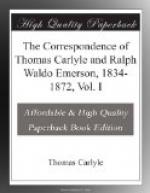This morning in happiest time I have a letter from George Ripley, who tells me you have written him, and that you say pretty confidently you will come next summer. Io paean! He tells me also that Alexander Everett (brother of Edward) has sent you the friendly notice that has just appeared in the North American Review, with a letter.* All which I hope you have received. I am delighted, for this man represents a clique to which I am a stranger, and which I supposed might not love you. It must be you shall succeed when Saul prophesies. Indeed, I have heard that you may hear the Sartor preached from some of our best pulpits and lecture-rooms. Don’t think I speak of myself, for I cherish carefully a salutary horror at the German style, and hold off my admiration as long as ever I can. But all my importance is quite at an end. For now that Doctors of Divinity and the solemn Review itself have broke silence to praise you, I have quite lost my plume as your harbinger.
----------- * Mr. A.H. Everett’s paper on Sartor Resartus was published in the North American Review for October, 1835. -----------
I read with interest what you say of the political omens in England. I could wish our country a better comprehension of its felicity. But government has come to be a trade, and is managed solely on commercial principles. A man plunges into politics to make his fortune, and only cares that the world should last his day. We have had in different parts of the country mobs and moblike legislation, and even moblike judicature, which have betrayed an almost godless state of society; so that I begin to think even here it behoves every man to quit his dependency on society as much as he can, as he would learn to go without crutches that will be soon plucked away from him, and settle with himself the principles he can stand upon, happen what may. There is reading, and public lecturing too, in this country, that I could recommend as medicine to any gentleman who finds the love of life too strong in him.
If virtue and friendship have not yet become fables, do believe we keep your face for the living type. I was very glad to hear of the brother you describe, for I have one too, and know what it is to have presence in two places. Charles Chauncy Emerson is a lawyer now settled in this town, and, as I believe, no better Lord Hamlet was ever. He is our Doctor on all questions of taste, manners, or action. And one of the pure pleasures I promise myself in the months to come is to make you two gentlemen know each other.
X. Emerson to Carlyle
Concord, Mass., 8 April, 1856




